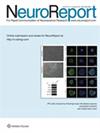Differential changes in Wnt7 and Dkk1 levels in astrocytes exposed to glutamate or TNFα.
IF 1.6
4区 医学
Q4 NEUROSCIENCES
引用次数: 0
Abstract
Wnt signaling plays an important role in adult brain function, and its dysregulation has been implicated in the loss of neuronal homeostasis. Despite the existence of many studies on the participation of the Wnt pathway in adult neurons, its regulation in astrocytes has been scarcely explored. Several reports point to the presence of Wnt ligands in astrocytes and their possible impact on neuronal plasticity or neuronal death. We aimed to analyze the effect of the neurotransmitter glutamate and the inflammatory cytokine TNFα on the mRNA and protein levels of the canonical Wnt agonist Wnt7a and the antagonist Dkk1 in cultured astrocytes. Primary astrocyte cultures from rat cerebral cortices were exposed to glutamate or TNFα. Wnt7a and Dkk1 expression was analyzed by RT-qPCR and its protein abundance and distribution was assessed by immunofluorescence. We found high basal expression and protein levels of Wnt7a and Dkk1 in unstimulated astrocytes and overproduction of Dkk1 mRNA induced by the two stimuli. These results reveal the astrocytic source of the canonical Wnt ligands Wnt7a and Dkk1, whose levels are differentially regulated by glutamate and TNFα. Astrocytes are a significant source of Wnt ligands, the production of which can be differentially regulated under excitatory or proinflammatory conditions, thereby impacting neuronal function.暴露于谷氨酸或 TNFα 的星形胶质细胞中 Wnt7 和 Dkk1 水平的差异变化。
Wnt 信号在成人大脑功能中发挥着重要作用,其失调与神经元失去平衡有关。尽管已有许多关于 Wnt 通路参与成人神经元的研究,但对其在星形胶质细胞中的调控却鲜有探讨。一些报道指出星形胶质细胞中存在 Wnt 配体,它们可能对神经元的可塑性或神经元的死亡产生影响。我们的目的是分析神经递质谷氨酸和炎症细胞因子 TNFα 对培养的星形胶质细胞中典型 Wnt 激动剂 Wnt7a 和拮抗剂 Dkk1 的 mRNA 和蛋白质水平的影响。大鼠大脑皮层的原代星形胶质细胞培养物暴露于谷氨酸或 TNFα。通过 RT-qPCR 分析 Wnt7a 和 Dkk1 的表达,并通过免疫荧光评估其蛋白丰度和分布。我们发现,在未受刺激的星形胶质细胞中,Wnt7a 和 Dkk1 的基础表达量和蛋白水平都很高,而在这两种刺激的诱导下,Dkk1 mRNA 的表达量过高。这些结果揭示了典型Wnt配体Wnt7a和Dkk1的星形胶质细胞来源,它们的水平受谷氨酸和TNFα的不同调节。星形胶质细胞是Wnt配体的重要来源,其产生可在兴奋或促炎条件下受到不同程度的调节,从而影响神经元的功能。
本文章由计算机程序翻译,如有差异,请以英文原文为准。
求助全文
约1分钟内获得全文
求助全文
来源期刊

Neuroreport
医学-神经科学
CiteScore
3.20
自引率
0.00%
发文量
150
审稿时长
1 months
期刊介绍:
NeuroReport is a channel for rapid communication of new findings in neuroscience. It is a forum for the publication of short but complete reports of important studies that require very fast publication. Papers are accepted on the basis of the novelty of their finding, on their significance for neuroscience and on a clear need for rapid publication. Preliminary communications are not suitable for the Journal. Submitted articles undergo a preliminary review by the editor. Some articles may be returned to authors without further consideration. Those being considered for publication will undergo further assessment and peer-review by the editors and those invited to do so from a reviewer pool.
The core interest of the Journal is on studies that cast light on how the brain (and the whole of the nervous system) works.
We aim to give authors a decision on their submission within 2-5 weeks, and all accepted articles appear in the next issue to press.
 求助内容:
求助内容: 应助结果提醒方式:
应助结果提醒方式:


